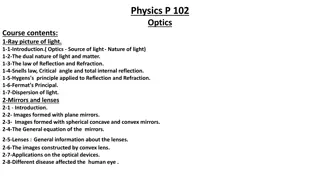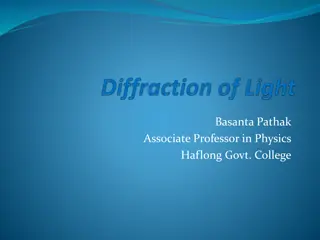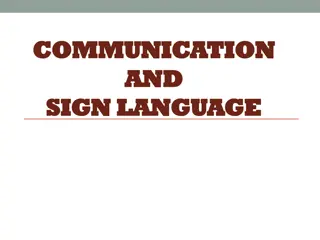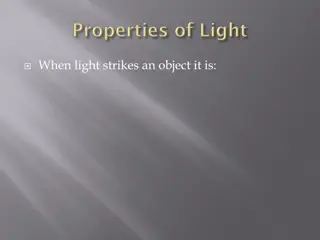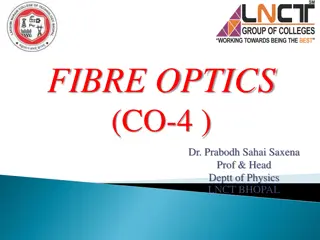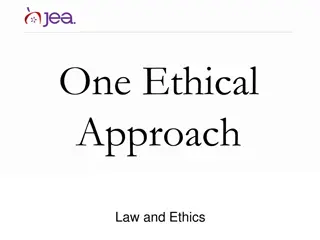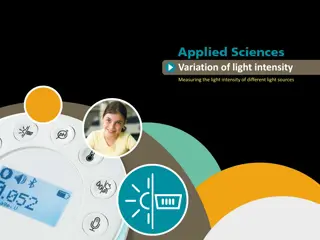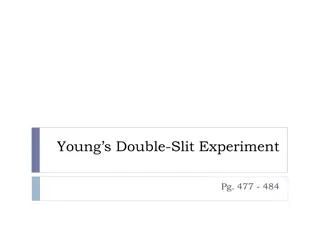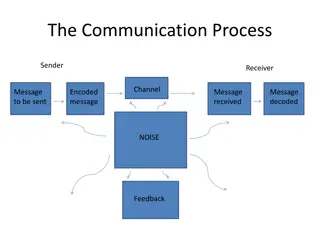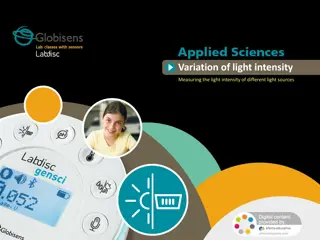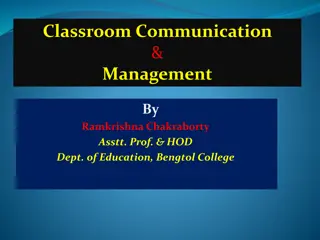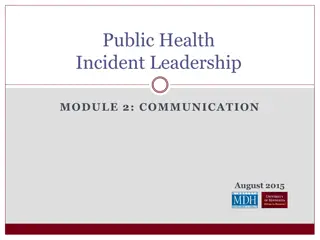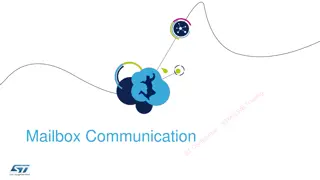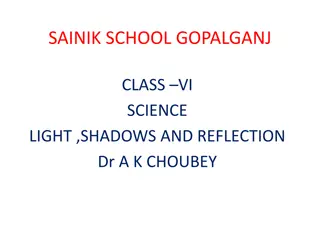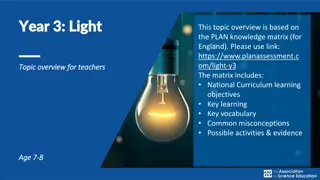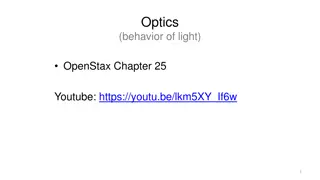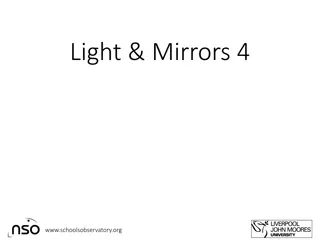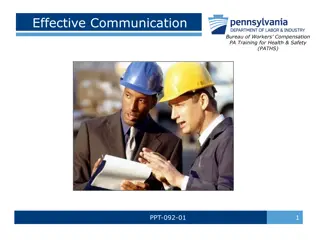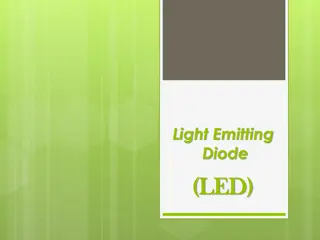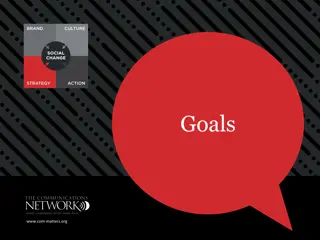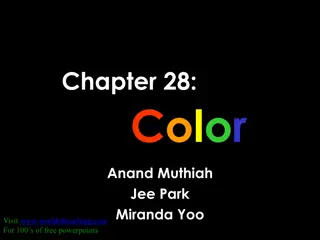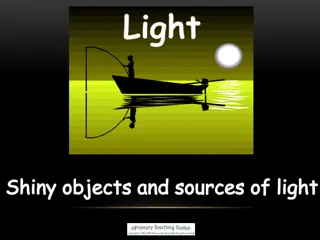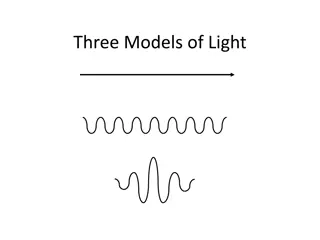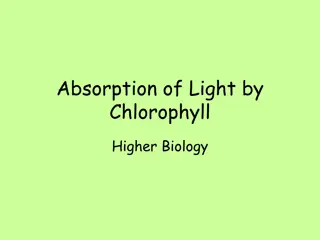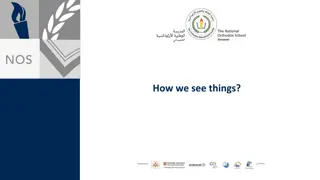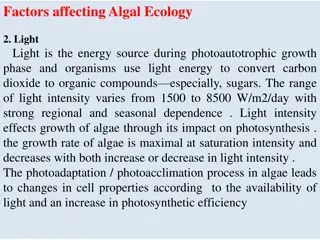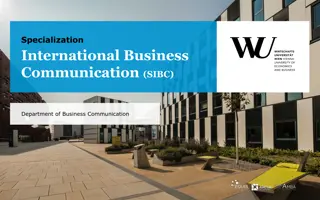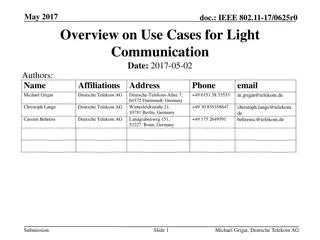Exploring Optics: Light Behavior and Properties
Optics studies the behavior of light, its interaction with matter, and the construction of instruments using or detecting light. From the dual nature of light to the laws of reflection and refraction, this branch of physics delves into topics like mirrors, lenses, and the dispersion of light. Practi
2 views • 15 slides
Understanding Prism Terminology and Light Deviation
Prisms are optical devices that deviate light without changing its vergence. This module explores the various terminology associated with prisms, including Apex, Base, Refracting Angle, and Angle of Deviation. The passage of light through a prism follows Snell's Law, where the ray is deviated toward
4 views • 42 slides
Understanding Diffraction of Light: Types and Distinctions
The propagation of light according to the wave theory involves diffraction, where light waves exhibit bending around obstacles, causing a decrease in intensity. There are two main types of diffraction - Fresnel's and Fraunhofer's, each characterized by different conditions and behaviors. The distinc
1 views • 7 slides
Evolution of Integrated Light Communication in IEEE 802.11
Recent discussions in IEEE 802.11 focus on the evolution of Light Communication (LC) to meet market needs and technological advancements. The proposal suggests forming a study group to define parameters for Integrated Light Communication (ILC) to enhance mass market adoption.
0 views • 8 slides
Workers Compensation Solutions for Light Duty Job Assignments
Learn effective solutions for Workers Compensation Light Duty job assignments. This guide provides strategies to create and implement light-duty roles, helping injured employees return to work safely and efficiently. Understand essential benefits and best practices for managing light-duty assignment
9 views • 4 slides
Mastering Business Writing Skills: A Comprehensive Guide
Understanding the essence of business communication, types of communication, essentials of effective communication, smart communication tips, and communication across cultures is vital for professional success. Explore verbal, written, and non-verbal communication methods to enhance your communicati
0 views • 47 slides
Understanding Communication and Sign Language
Communication is the vital process of exchanging information, ideas, and emotions through various channels such as speech, signals, and writing. This includes verbal and non-verbal communication, where sign language plays a crucial role. Effective communication depends on the sender, message, channe
1 views • 31 slides
Enhancing Zoonotic Disease Risk Communication in Public Health Emergencies
Explore the significance of adopting a One Health approach to zoonotic disease risk assessment and communication in the context of emergency health situations. The session emphasizes core capacities required by the International Health Regulations (IHR) 2005, effective risk communication processes,
2 views • 13 slides
Effective Communication Skills for Healthcare Professionals
Enhance your communication skills with the Accelerated Preceptorship Communication Session by Desiree Cox. Learn the importance of effective communication, different communication preferences, communication dynamics, non-verbal communication, listening skills, and more. Understand the communication
2 views • 28 slides
Understanding the Interaction of Light with Objects
When light strikes an object, it can be reflected, transmitted, or absorbed, depending on the material of the object. Transparent materials allow light to pass through, translucent materials scatter light, and opaque materials absorb and reflect light. The color of objects is the color they reflect,
6 views • 17 slides
Overview of Optical Fibre Technology and Applications
Optical fibre technology, spearheaded by Dr. Prabodh Sahai Saxena, revolutionizes communication systems through light transmission. This cutting-edge technology utilizes fibre optics made of glass or plastic to carry light signals, offering advantages like high bandwidth, low signal loss, and no ele
0 views • 20 slides
Evolution of Light Theory: From Wave Theory to Quantum Theory
At the turn of the century, the discovery of the photoelectric effect challenged the wave theory of light, leading to the development of the quantum theory by Max Planck and Albert Einstein. This new theory introduced the concept of discrete energy units known as quanta, bridging the gap between wav
1 views • 62 slides
Light Tracking Servo System Using Cadmium Sulfide Resistors
Introduction to an Arduino-based light tracking system using Cadmium Sulfide light-dependent resistors. The system tracks the maximum light intensity and automatically adjusts its direction towards the brightest source. It includes an Arduino-based Lux Meter and specifications such as DAC resolution
0 views • 7 slides
Ethical Approaches in Journalism: Red Light vs. Green Light Ethics
Explore the contrasting perspectives of Red Light and Green Light ethics in journalism, where Red Light focuses on caution and restraint while Green Light emphasizes action and opportunity. Dive into the nuances of ethical decision-making in journalism and consider the impact of language on ethical
0 views • 13 slides
Understanding Light Intensity Variation in Different Sources
Explore the correlation between light intensity and efficiency in various light sources through an intriguing experiment. Delve into the theoretical framework and practical applications to grasp the essence of light intensity and its distribution. Uncover the factors influencing the efficiency of li
0 views • 21 slides
Understanding Young's Double-Slit Experiment and Interference Patterns
Thomas Young's double-slit experiment in the late 1700s provided evidence of light behaving as a wave, showcasing interference patterns. This experiment challenged the particle theory of light and supported the wave theory. The interference patterns observed helped scientists grasp the wave nature o
0 views • 27 slides
Effective Communication Strategies in Business Environments
Explore the various aspects of communication processes within organizations, including sender-receiver dynamics, communication channels, small group networks, upward and downward communication methods, business communication tools, information richness of channels, email and voice mail etiquette, an
0 views • 21 slides
Understanding Light Intensity: Measuring Different Light Sources
Explore the concept of light intensity by measuring various light sources and their efficiency. Through practical experiments, understand the relationship between light intensity and the output of different light sources. Theoretical frameworks, practical applications, and key concepts are discussed
0 views • 21 slides
Understanding Classroom Communication and Management by Ramkrishna Chakraborty
Communication is a vital process of exchanging information, ideas, and opinions between individuals. In the educational context, effective communication is essential for achieving desired behavior patterns. This article explores the meaning, concept, and types of communication, emphasizing the impor
1 views • 19 slides
Effective Communication Strategies in Public Health Incident Leadership
Learn about the importance of effective communication within emergency operations centers during public health incidents. Explore communication tools, techniques, and case examples of communication failures. Discover key aspects such as team communication, situational awareness, shared mental models
0 views • 16 slides
Understanding Light: Basic Properties and Interactions
Explore the fundamental properties of light such as its speed compared to sound, the formation of shadows, and how we see things through reflection. Dive into types of light interactions like refraction and reflection, understanding how light behaves when passing through different mediums and intera
0 views • 27 slides
Communication Protocols for System Integration
This technical document explores various communication protocols used for system integration, focusing on mailbox communication, interprocessor communication, system communication using IPCC, and BLE communication utilizing different IPCC channels. The document delves into the features, functions, a
1 views • 6 slides
Understanding Light, Shadows, and Reflection in Science
Light is a vital form of energy that helps us see objects. Luminous objects emit light, while non-luminous objects do not. Understanding how light interacts with objects, creating shadows and reflections, is crucial in science. Transparent objects allow light to pass through, translucent objects all
0 views • 13 slides
Understanding Light: Key Concepts for Year 3 Students
Delve into the world of light with Year 3 students through engaging activities and explorations. Learn about sources of light, shadows, reflective surfaces, and the importance of light for vision. Discover how light helps us see and how shadows are formed, while exploring materials and objects that
0 views • 9 slides
Understanding the Behavior of Light in Optics
Light in optics can be described as a wave, a particle, or a ray. The ray model of light explains how light travels in straight lines unless it interacts with a surface or changes media. By tracing rays back, we can locate objects and understand how light interacts with matter at boundaries between
0 views • 39 slides
Effective Communication Skills in Business Environment
Understand the importance of communication in organizations, learn about the process of communication, main objectives, types, and patterns of communication. Explore key points such as accuracy in conveying ideas, feedback, and communication channels. Enhance your knowledge on downward, upward, and
0 views • 24 slides
Mastering Effective Communication Skills in Daily Life
Enhance your communication skills with insights from Unit 5 Communication. Learn about different types of communication, speaking skills, effective communication strategies, assertiveness, and more. Understand the nuances of verbal, nonverbal, and paralanguage communication to convey your message cl
0 views • 52 slides
Exploring Light and Mirrors: Investigations and Discoveries
Delve into the world of light and mirrors as we investigate angles of reflection, examine how mirrors affect the perception of objects, and explore the use of periscopes in observing underwater. Discover the rules governing the reflection of light beams and unravel the mysteries of how mirrors manip
0 views • 11 slides
Effective Communication in Workplace Safety Training
This presentation covers the importance of effective communication in workplace safety training, emphasizing the elements of a communication plan, communication processes, and the realities of communication. It explores the consequences of failure to communicate safety information effectively and di
1 views • 31 slides
Communication Costs in Distributed Sparse Tensor Factorization on Multi-GPU Systems
This research paper presented an evaluation of communication costs for distributed sparse tensor factorization on multi-GPU systems. It discussed the background of tensors, tensor factorization methods like CP-ALS, and communication requirements in RefacTo. The motivation highlighted the dominance o
0 views • 34 slides
Understanding Light Emitting Diodes (LEDs)
Light Emitting Diodes (LEDs) are semiconductor devices that convert electrical energy into visible or invisible light. They are constructed using gallium, phosphorus, and arsenic materials instead of silicon or germanium. The recombination process in forward bias condition is crucial for the operati
0 views • 19 slides
Strategic Communication Goals and Objectives
Clearly defining goals and objectives is essential in strategic communication. This involves setting realistic and aligned targets, such as building communication capacity, influencing policy, and engaging public will. Communication plays a crucial role in achieving social change and programmatic su
0 views • 67 slides
Understanding Color: A Comprehensive Overview
Color is a fascinating aspect of our visual world, explored through the prism of science and light. This chapter delves into the origins of color perception, from Isaac Newton's study of the color spectrum to the reflection and transmission of light that determines how we see colors. Gain insights i
0 views • 28 slides
Understanding Sources of Light and Reflection
Exploring the concept of light sources and reflection, the article delves into how light is created by various objects like the sun, light bulbs, and fires. It explains the difference between sources of light and objects that reflect light, such as shiny metal surfaces. The reader is encouraged to i
0 views • 14 slides
Exploring Models of Light: Ray Model and Wave Model
This informative content delves into the Ray Model of Light, discussing how light travels in straight lines known as rays and how it can be made visible. It also explores the Wave Model of Light, covering topics like diffraction and the reasons why we often do not notice it. Additionally, the text t
0 views • 9 slides
Understanding Light Absorption by Chlorophyll in Biology
Explore how chlorophyll absorbs light in photosynthesis, the role of different types of seaweeds, and the use of spectrometers to measure light absorption. Discover the specific light regions absorbed by chlorophyll A and B, as well as adaptations in seaweeds for varying light intensities. Learn abo
0 views • 9 slides
Understanding Light: How We See and Interact with Objects
Explore the fascinating world of light and vision, from how light travels in straight lines to how we perceive objects. Learn about luminous and nonluminous objects, the different categories of light sources, and the vocabulary associated with light interactions. Delve into the concepts of emitting,
0 views • 7 slides
Factors Affecting Algal Ecology: Light Intensity Impacts on Algae Growth and Composition
Light intensity plays a crucial role in the growth and composition of algae. Algae undergo photoadaptation processes to adjust to varying light levels, affecting their photosynthetic efficiency and cellular properties. High light intensity can lead to photoinhibition and changes in cellular composit
0 views • 19 slides
Specialization in International Business Communication (SIBC)
Specialization in International Business Communication (SIBC) offered by the Department of Business Communication focuses on the critical role of communication in various business settings, emphasizing skills in language usage, communicative competence, and strategic language application. The progra
0 views • 11 slides
Overview of Use Cases for Light Communication in IEEE 802.11-17/0625r0
This document discusses use cases for Optical Wireless Communication (OWC) or Light Communication (LC) categorized into Visible Light Communication (VLC), Free-Space Optics (FSO), and other applications. LC offers new solutions for connectivity, short and long-range applications, outdoor scenarios,
0 views • 10 slides
